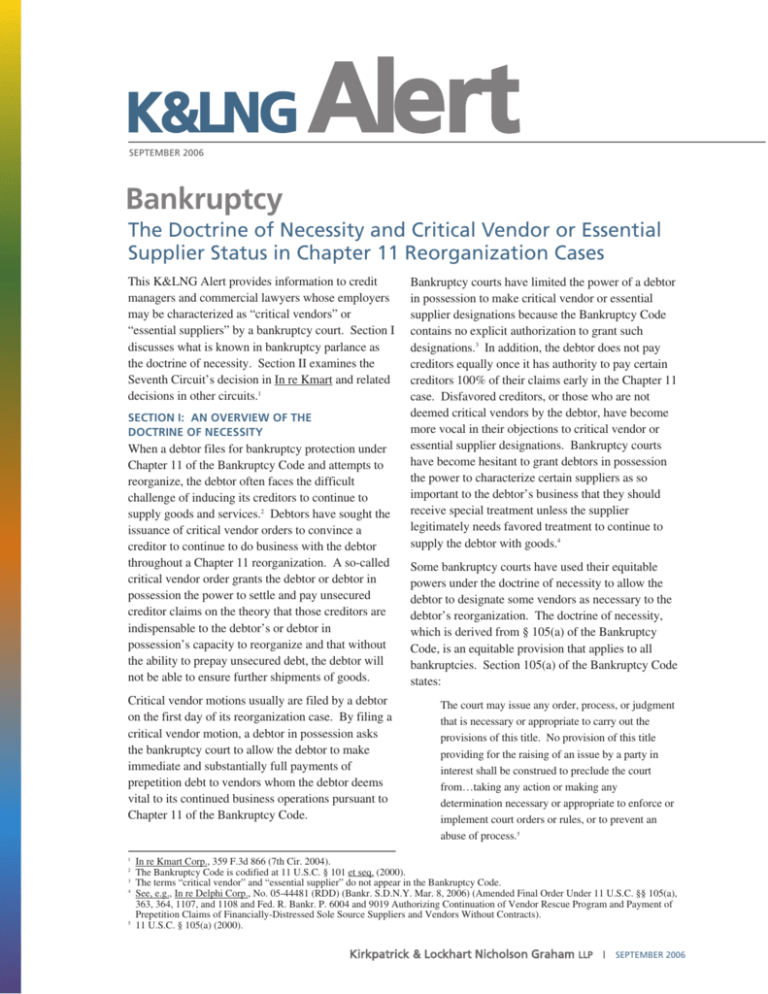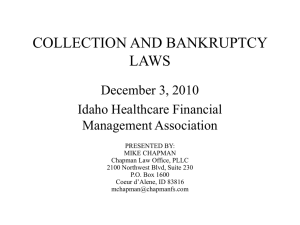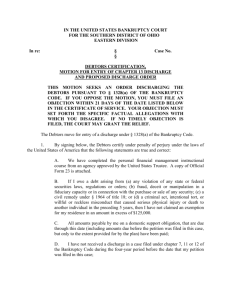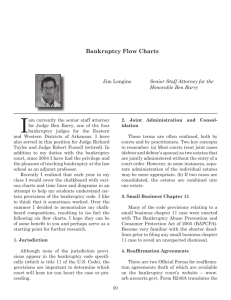
K&LNG
SEPTEMBER 2006
Alert
Bankruptcy
The Doctrine of Necessity and Critical Vendor or Essential
Supplier Status in Chapter 11 Reorganization Cases
This K&LNG Alert provides information to credit
managers and commercial lawyers whose employers
may be characterized as “critical vendors” or
“essential suppliers” by a bankruptcy court. Section I
discusses what is known in bankruptcy parlance as
the doctrine of necessity. Section II examines the
Seventh Circuit’s decision in In re Kmart and related
decisions in other circuits.1
SECTION I: AN OVERVIEW OF THE
DOCTRINE OF NECESSITY
When a debtor files for bankruptcy protection under
Chapter 11 of the Bankruptcy Code and attempts to
reorganize, the debtor often faces the difficult
challenge of inducing its creditors to continue to
supply goods and services.2 Debtors have sought the
issuance of critical vendor orders to convince a
creditor to continue to do business with the debtor
throughout a Chapter 11 reorganization. A so-called
critical vendor order grants the debtor or debtor in
possession the power to settle and pay unsecured
creditor claims on the theory that those creditors are
indispensable to the debtor’s or debtor in
possession’s capacity to reorganize and that without
the ability to prepay unsecured debt, the debtor will
not be able to ensure further shipments of goods.
Critical vendor motions usually are filed by a debtor
on the first day of its reorganization case. By filing a
critical vendor motion, a debtor in possession asks
the bankruptcy court to allow the debtor to make
immediate and substantially full payments of
prepetition debt to vendors whom the debtor deems
vital to its continued business operations pursuant to
Chapter 11 of the Bankruptcy Code.
1
2
3
4
5
Bankruptcy courts have limited the power of a debtor
in possession to make critical vendor or essential
supplier designations because the Bankruptcy Code
contains no explicit authorization to grant such
designations.3 In addition, the debtor does not pay
creditors equally once it has authority to pay certain
creditors 100% of their claims early in the Chapter 11
case. Disfavored creditors, or those who are not
deemed critical vendors by the debtor, have become
more vocal in their objections to critical vendor or
essential supplier designations. Bankruptcy courts
have become hesitant to grant debtors in possession
the power to characterize certain suppliers as so
important to the debtor’s business that they should
receive special treatment unless the supplier
legitimately needs favored treatment to continue to
supply the debtor with goods.4
Some bankruptcy courts have used their equitable
powers under the doctrine of necessity to allow the
debtor to designate some vendors as necessary to the
debtor’s reorganization. The doctrine of necessity,
which is derived from § 105(a) of the Bankruptcy
Code, is an equitable provision that applies to all
bankruptcies. Section 105(a) of the Bankruptcy Code
states:
The court may issue any order, process, or judgment
that is necessary or appropriate to carry out the
provisions of this title. No provision of this title
providing for the raising of an issue by a party in
interest shall be construed to preclude the court
from…taking any action or making any
determination necessary or appropriate to enforce or
implement court orders or rules, or to prevent an
abuse of process.5
In re Kmart Corp., 359 F.3d 866 (7th Cir. 2004).
The Bankruptcy Code is codified at 11 U.S.C. § 101 et seq. (2000).
The terms “critical vendor” and “essential supplier” do not appear in the Bankruptcy Code.
See, e.g., In re Delphi Corp., No. 05-44481 (RDD) (Bankr. S.D.N.Y. Mar. 8, 2006) (Amended Final Order Under 11 U.S.C. §§ 105(a),
363, 364, 1107, and 1108 and Fed. R. Bankr. P. 6004 and 9019 Authorizing Continuation of Vendor Rescue Program and Payment of
Prepetition Claims of Financially-Distressed Sole Source Suppliers and Vendors Without Contracts).
11 U.S.C. § 105(a) (2000).
Kirkpatrick & Lockhart Nicholson Graham LLP |
SEPTEMBER 2006
However, courts have ruled that this section alone
does not give a bankruptcy court authority to act in
defiance of other provisions of the Bankruptcy Code.
Because there is no provision in the Bankruptcy Code
expressly authorizing critical vendor or essential
supplier payments, and because such payments
seemingly destroy the tenet that all similarly-situated
creditors are to be treated equally under bankruptcy
law, some bankruptcy courts have questioned the
validity of critical vendor or essential supplier orders,
while other bankruptcy courts refuse to enter the
orders when requested.
SECTION II: KMART AND RELATED CASES IN
OTHER CIRCUITS: THE VALIDITY OF CRITICAL
VENDOR AND ESSENTIAL SUPPLIER
DESIGNATIONS
The Seventh Circuit’s Kmart Decision
On February 24, 2004, the Seventh Circuit released
its decision in In re Kmart Corp.6 On the first day of
its Chapter 11 reorganization case, Kmart sought
permission to pay the full prepetition claims of all of
its critical vendors immediately. Kmart did not
present evidence to the Bankruptcy Court as to which
vendors were critical to its reorganization. In
considering the critical vendor motion, the
Bankruptcy Court concluded that the equitable
provisions of § 105(a) of the Bankruptcy Code allow
bankruptcy courts to issue critical vendor orders.
The Bankruptcy Court granted Kmart authority to
pay any debt to any vendor that Kmart itself deemed
critical so long as each vendor agreed to provide
Kmart with goods for two years on customary trade
terms.7
Kmart had tens of thousands of creditors, over four
thousand of whom were trade vendors. Instead of
naming a handful of creditors as critical vendors,
Kmart designated 2,330 vendors (roughly 54% of all
of its trade vendors) as critical vendors and paid their
prepetition debts in full.8 These 2,330 vendors
received 100% of their prepetition claims in cash,
totaling approximately $300 million. Upon
confirmation of Kmart’s Chapter 11 plan, the 2,000
disfavored vendors received 10 cents on the dollar for
prepetition claims, and most of those claims were
paid in stock of the reorganized Kmart. Because of
the unequal treatment of creditors, the disfavored
vendors and other unsecured creditors wanted Kmart
to recover the payments made to critical vendors.
When the case reached the Seventh Circuit, Judge
Easterbrook issued a decision that now restricts the
availability of critical vendor designations in the
Seventh Circuit.
Judge Easterbrook determined that a critical vendor
order cannot be upheld solely by the equitable
provisions of § 105(a) of the Bankruptcy Code. He
concluded that § 105(a) does not grant a court
discretion to set aside the Bankruptcy Code’s rules
governing priority and distribution. Judge
Easterbrook observed that no circuit-level court had
ever explicitly allowed a bankruptcy court to use
§ 105(a) of the Bankruptcy Code to authorize full
payment of any unsecured debt unless all unsecured
creditors are paid in full.
The Seventh Circuit suggested that the only way that
a debtor in possession in the Seventh Circuit may be
able to justify a critical vendor order after the Kmart
decision is through the use of § 363(b) of the
Bankruptcy Code. Section 363(b)(1) states: “The
trustee [or debtor in possession], after notice and a
hearing, may use, sell, or lease, other than in the
ordinary course of business, property of the estate.”9
Judge Easterbrook did not reject using § 363(b)(1) as
a way to justify critical vendor orders because
payment of prepetition debts to keep a supply of
“critical” goods is a use of property of the bankruptcy
estate that falls outside the ordinary course of
business.10
In Kmart, Judge Easterbrook hinted at the type of
evidence that a bankruptcy court in the Seventh
Circuit should require before it issues a critical
vendor order. Before granting a party critical vendor
status in the Seventh Circuit, a bankruptcy court must
first make factual findings that the disfavored
creditors will be as well off with reorganization as
with liquidation and that the critical vendor would
have refused to deliver goods if the vendor’s debts
were left unpaid throughout the duration of the
bankruptcy proceedings.11 Judge Easterbrook
In re Kmart Corp., 359 F.3d 866 (7th Cir. 2004).
Id. at 869
8
Id. The Bankruptcy Court issued an order that authorized Kmart to pay the prepetition claims of a food distribution company that
provided substantially all Kmart’s food products, the company’s sole music supplier, vendors who supplied eggs and dairy products,
and certain newspapers and printers who supplied goods and services relating to Kmart’s advertising program. See In re Kmart Corp.,
Case No. 02-B-02474, Motion Authorizing the Payment of Prepetition Claims of Certain Critical Trade Vendors (N.D. Ill. Jan. 22,
2002).
9
11 U.S.C. § 363(b)(1) (2000).
10
In re Kmart Corp., 359 F.3d at 872.
11
Id. at 873.
6
7
2
Kirkpatrick & Lockhart Nicholson Graham
LLP
| SEPTEMBER 2006
stressed that most creditors do not need prepetition
claims to be paid in full at an early stage because
most companies will continue to do business with a
debtor if the debtor pays for goods purchased
postpetition. In order to be granted critical vendor
status and to receive immediate payment of
prepetition debt, however, a vendor must convince
the court that it will actually cease doing business
with the debtor unless the debt is paid.
Because of the type of evidence the Seventh Circuit
now requires before a bankruptcy court is permitted
to issue a critical vendor, there are some situations
where it appears a creditor will not qualify for critical
vendor status. For example, the automatic stay
provisions of § 362 of the Bankruptcy Code prevent
a vendor with a long-term contract with the debtor
from refusing to make postpetition deliveries if the
debtor pays for the postpetition deliveries.12
Additionally, a court is unlikely to find that a large
financially-stable vendor who provides goods to a
debtor that can be easily obtained from another
source will refuse to make postpetition deliveries of
goods for which it is being paid. However, a small
financially-distressed vendor who makes an integral
component specifically for the debtor should be able
to prove to a bankruptcy court that it will refuse to
continue to deliver products to the debtor postpetition
unless it receives payment on prepetition debt. In
that situation, the vendor’s own financial affairs
might force it to stop producing goods until it
receives the debtor’s payment. In such a case,
following Judge Easterbrook’s discussion in Kmart,
the bankruptcy court should be satisfied that the
vendor will refuse to make future deliveries
postpetition unless it receives immediate payment of
its prepetition claims.
Another important wrinkle in the Kmart decision is
that Judge Easterbrook declared that the trustee could
recover payments previously made to critical vendors
under the critical vendor order. The court stated that
when critical vendor orders are later overturned by
an appellate court, the trustee or debtor in possession
can recover the money already paid to those
creditors. Therefore, even if a vendor receives full
12
13
prepetition payment of its claims under a critical
vendor order, an appellate court may reverse the
decision of the trial court and order that the payments
made to those critical vendors be returned to the
bankruptcy estate.
The Doctrine of Necessity in Other Circuits
Second Circuit
Recent orders in the Delphi and Dana bankruptcy
cases in the Southern District of New York show that
trade creditors can still obtain critical vendor or
essential supplier status in the Second Circuit. On
March 8, 2006, the Bankruptcy Court for the
Southern District of New York entered an amended
final order authorizing Delphi Corporation to pay up
to $90 million of its prepetition debts to financiallydistressed sole source suppliers and vendors who did
not have enforceable contracts with Delphi. To make
payments under the essential supplier order, Delphi is
required to make a diligent effort to enter into a trade
agreement with an essential supplier. The trade
agreement requires the essential supplier to make
certain concessions, including:
(1) the essential supplier will continue to offer
customary trade terms to Delphi which are at
least as beneficial to Delphi as those extended
in the twelve-month period before Delphi’s
petition date;
(2) the essential supplier will not seek payment
for reclamation claims outside of its essential
supplier negotiations with Delphi; and
(3) the essential supplier will not file a lien for
any remaining unpaid portion of its prepetition
claim against Delphi.13
It should be noted that the Bankruptcy Court allowed
Delphi to grant essential supplier status to
financially-distressed suppliers who made unique
goods. The essential vendor order in Delphi shows
that the financial status of the essential supplier is
relevant to the Bankruptcy Court for the Southern
District of New York’s determination of whether it
should grant preferential treatment to a supplier of
unique goods.
Id.
In re Delphi Corp., No. 05-44481 (RDD) (Bankr. S.D.N.Y. Mar. 9, 2006) (Amended Final Order Under 11 U.S.C. §§ 105(a), 363,
364, 1107, and 1108 and Fed. R. Bankr. P. 6004 and 9019 Authorizing Continuation of Vendor Rescue Program and Payment of
Prepetition Claims of Financially-Distressed Sole Source Suppliers and Vendors Without Contracts). If the essential supplier refuses
to enter into the requisite trade agreement with Delphi, Delphi is permitted to pay an essential supplier’s prepetition claims if Delphi
determines that failure to pay the claims is likely to result in irreparable harm to its business operations. Id.
3
Kirkpatrick & Lockhart Nicholson Graham
LLP
| SEPTEMBER 2006
Also in March 2006, the Bankruptcy Court for the
Southern District of New York granted Dana
Corporation’s essential supplier motion to pay its
essential suppliers up to $52.1 million.14 In order to
receive payments under the essential supplier order,
trade creditors are required to extend normalized
trade credit and provide other business terms which
are at least as favorable as those extended prepetition
until Dana emerges from its Chapter 11 case. If a
trade creditor accepts payment under the essential
supplier order but does not provide Dana with the
requisite trade terms, the Bankruptcy Court will
deem the payment an unauthorized postpetition
transfer under § 549 of the Bankruptcy Code and will
allow the debtor to recover the funds. Another
power that the Bankruptcy Court granted Dana in the
essential supplier order is the authority to pay
administrative priority claims under § 503(b)(9)
immediately. The ability to pay administrative
priority claims and essential supplier claims at the
beginning of the case gives Dana leverage to
negotiate favorable trade terms with its creditors.
While no bankruptcy court in the Second Circuit has
expressly stated a standard by which critical vendor
motions will be judged, it appears that the
Bankruptcy Court for the Southern District of New
York is willing to issue essential supplier orders in
situations where the essential supplier is financially
distressed to the point that it requires the payment of
its prepetition claims in order to produce goods to
ship to the debtor.
Third Circuit
The status of critical vendors has not been litigated in
the Third Circuit since Kmart was decided. Though
a bankruptcy judge deciding whether or not he or she
should grant a critical vendor motion would probably
consider Judge Easterbrook’s opinion, precedent
would currently permit prepetition payments to a
critical vendor by virtue of the doctrine of necessity
under § 105(a).15 In its decision to grant the debtor’s
critical vendor motion in In re Just for Feet, the
Bankruptcy Court for the District of Delaware
explicitly rejected an argument that § 105(a) did not
permit the court to issue a critical vendor order that
authorizes prepetition claims. Indeed, according to
the Bankruptcy Court, the only issue that the court
must decide in determining if it should exercise its
equitable powers and grant the debtor’s motion is
whether the debtor has met its burden of
demonstrating that the payment of the prepetition
claims is “critical to the debtor’s reorganization.”16
While the Third Circuit likely will reevaluate critical
vendor designations in light of Kmart, there have
been no recent decisions from the Third Circuit
which discuss a more restrictive approach to critical
vendor orders.
Fourth Circuit
The Bankruptcy Court for the Eastern District of
Virginia cited Kmart in a recent decision that
significantly limits the application of the doctrine of
necessity to critical vendors. The Bankruptcy Court
declared that in order to use the doctrine of necessity
as a basis for the pre-confirmation payment of a
critical vendor’s prepetition claim:
(1) the vendor must be necessary for the
successful reorganization of the debtor;
(2) the transaction must be in the sound
business judgment of the debtor; and
(3) the favorable treatment of the critical
vendor must not prejudice other unsecured
creditors.17
In order to satisfy the first prong of the test, the
debtor must show both that there is no substitute
vendor available, even at a greater price, and that the
critical vendor will refuse to deal with the debtor
unless it is paid in full for its prepetition claims.
The Bankruptcy Court stated that evidence will be
heavily scrutinized and that courts are generally
skeptical of a vendor’s statement that it will refuse to
continue to supply goods and services to the debtor.
As such, the Bankruptcy Court requires solid
evidence as to why the creditor would refuse to deal
with the debtor postpetition.
While the Bankruptcy Court did not fully explain
why paying some unsecured creditors 100% of their
prepetition claims would not prejudice the disfavored
unsecured creditors, the Bankruptcy Court did state
that if a critical vendor refuses to conduct business
with the debtor until its prepetition claim is paid, the
In re Dana Corp., No. 06-10354 (BRL) (Bankr. S.D.N.Y. Mar. 29, 2006) (Amended Final Order, Pursuant to Sections 105(a), 363(b), 364(b)
and 503(b)(9) of the Bankruptcy Code, Authorizing the Debtors to Pay Prepetition Claims of Certain Essential Suppliers and Administrative
Claimholders and Granting Certain Related Relief).
15
In re Just for Feet, Inc., 242 B.R. 821, 825 (Bankr. D. Del. 1999); see also In re Lehigh and New England Ry. Co., 657 F.2d 570, 581 (3d Cir.
1981); In re Penn Cent. Transp. Co., 467 F.2d 100, 102 (3d Cir. 1972); In re Columbia Gas Sys., Inc., 171 B.R. 189, 191-92 (Bankr. D. Del.
1994).
16
In re Just for Feet, Inc., 242 B.R. at 826.
17
In re United Am., Inc., 327 B.R. 776, 782 (Bankr. E.D. Va. 2005).
14
4
Kirkpatrick & Lockhart Nicholson Graham
LLP
|
SEPTEMBER 2006
debtor might be forced to breach other contracts
because it lacks necessary supplies. If breaching
another contract would be more costly to the debtor
and the bankruptcy estate than paying the critical
vendor’s prepetition claims, thereby increasing the
proceeds to distribute, the disfavored creditors are not
prejudiced from the critical vendor payments.
Fifth Circuit
Even courts that disagree with the Seventh Circuit’s
reasoning in Kmart have established high standards
for granting a critical vendor order. In In re CEI
Roofing, Inc., the Bankruptcy Court for the Northern
District of Texas declared that the combination of
§§ 105 and 362(a)(6) can serve as a basis for a debtor
to make payment on prepetition payments prior to the
confirmation of the Chapter 11 plan. The Bankruptcy
Court expressly rejected the Seventh Circuit’s position
that sections other than § 363(b) of the Bankruptcy
Code could not be used as a basis for critical vendor
payments.18
The Bankruptcy Court’s decision in CEI Roofing
allows a bankruptcy court to use § 362 of the
Bankruptcy Code to justify a critical vendor order.
Section 362 of the Bankruptcy Code establishes the
automatic stay, which virtually cuts off a creditor’s
ability to deal with the debtor outside of the formal
bankruptcy process. Section 362(a)(6) provides that
the filing of the petition acts as a stay of “any act to
collect, assess, or recover a claim against the debtor
that arose before the commencement of the case.”19
The Bankruptcy Court stated that under the
Bankruptcy Code, a court could terminate, annul or
modify the stay “for cause.” A debtor in possession
and its critical vendors can request relief from the
automatic stay “for cause.”
In order to show proper cause for the lifting of the
automatic stay to pay the prepetition claims of critical
vendors, the Bankruptcy Court in CEI Roofing
declared:
(1) it must be critical that the debtor deal with
the [critical vendor];
(2) unless the debtor deals with the [critical
vendor], the debtor risks the probability of
harm, or, alternatively, loss of economic
advantage to the estate or the debtor’s goingconcern value, which is disproportionate to the
amount of the [critical vendor’s] prepetition
claim; and
(3) there is no practical or legal alternative by
which the debtor can deal with the claimant
other than by the payment of the claim.20
The court in CEI Roofing also left open the
possibility of using § 1107(a) of the Bankruptcy
Code as a basis by which courts can order the
payment of prepetition debts before the confirmation
of the Chapter 11 plan of reorganization. Section
1107(a) contains an implied duty of the debtor in
possession to “protect and preserve the estate,
including an operating business’ going-concern
value.”21
Eleventh Circuit
The Bankruptcy Court in the Middle District of
Florida followed the Seventh Circuit’s lead and held
that a critical vendor order can be issued only if the
evidentiary record establishes that:
(1) payments are necessary to the debtor’s
reorganization;
(2) sound business justification exists for such
payment, in that critical vendors will refuse to
continue to do business with the debtor unless
they are afforded critical vendor status; and
(3) the disfavored creditors are at least as well
off as they would have been had a critical
vendor order not been entered.22
In In re Tropical Sportswear Int’l Corp., the
Bankruptcy Court upheld the debtor’s critical vendor
designation of four vendors. The vendors had
informed the debtor that they would cut off delivery
of goods unless the debtor agreed to pay 77.5 percent
of the prepetition debts immediately, pay any valid
reclamation claims in full and waive any potential
preference claims it had against the critical vendors.
In addition to continuing to deliver goods to the
debtor, the critical vendors agreed to waive all claims
for the remaining 22.5 percent of the prepetition
debts. The Bankruptcy Court noted that while
§ 363(b) of the Bankruptcy Code can be used for
payments made to critical vendors, the court has a
duty to limit critical vendor payments “to do the least
damage possible to priorities established by contract
and by other parts of the Bankruptcy Code.”23
In re CEI Roofing, Inc., 315 B.R. 50, 59 (Bankr. N.D. Tex. 2004).
11 U.S.C. § 362(a)(6) (2000).
In re CEI Roofing, Inc., 315 B.R. at 57.
21
Id.
22
In re Tropical Sportswear Int’l Corp., 320 B.R. 15, 17 (Bankr. M.D. Fla. 2005).
23
Id. at 16.
18
19
20
5
Kirkpatrick & Lockhart Nicholson Graham
LLP
|
SEPTEMBER 2006
CONCLUSION
When deciding whether to grant a critical vendor or
essential supplier order, it appears that bankruptcy
courts are becoming increasingly concerned with the
financial affairs of the vendor. If a vendor is in
financial peril to the extent that it will be unable to
provide unique goods essential to a debtor’s business
unless it receives full payment for its prepetition
claims, a court may be likely to grant that vendor
preferred status. However, a large financially-stable
vendor who provides products to a debtor that can be
easily obtained from another source will be unlikely
to receive critical vendor or essential supplier status.
In those cases, courts are likely to force the vendor to
decide whether it wants to continue to supply the
debtor with goods without being granted any priority
status.
While the Seventh Circuit’s Kmart decision limits the
use of critical vendor orders in the Seventh Circuit, a
creditor should still consider the availability of
critical vendor protection in its own jurisdiction.
6
Though many jurisdictions have begun to limit
critical vendor orders since Kmart, no court deciding
the issue has altogether rejected critical vendor
orders. Indeed, while critical vendor protection
appears to be more difficult to obtain, creditors prefer
to obtain full prepetition payment of their claims
rather than receiving pennies on the dollar in a final
distribution. Credit managers should consider
whether critical vendor protection is appropriate and
available when one of the creditor’s customers files
for bankruptcy.
David A. Murdoch
412.355.6472
dmurdoch@klng.com
Jamie A. Bishop
412.355.8227
jbishop@klng.com
Jeffrey N. Kinsey
412.355.8231
jkinsey@klng.com
Kirkpatrick & Lockhart Nicholson Graham
LLP
|
JULY 2006
If you have questions about this topic or would like more information on Kirkpatrick & Lockhart Nicholson
Graham LLP, please contact one of our lawyers listed below:
BOSTON
NEW YORK
John C. Hutchins
617.951.9165
jhutchins@klng.com
717.231.4512
aswope@klng.com
HARRISBURG
Andrew L. Swope
LONDON
Tony Griffiths
Robin B. Tutty
44.(0)20.7360.8195
44.(0)20.7360.8112
agriffiths@klng.com
rtutty@klng.com
LOS ANGELES
William J. Bernfeld
310.552.5014
wbernfeld@klng.com
212.536.4097
212.536.4812
212.536.4098
212.536.4800
jrich@klng.com
efox@klng.com
rmichaelson@klng.com
esinger@klng.com
PITTSBURGH
George M. Cheever
David A. Murdoch
412.355.6544 gcheever@klng.com
412.355.6472 dmurdoch@klng.com
WASHINGTON
Judith Sturtz Karp
MIAMI
Jeffrey T. Kucera
Jeffrey N. Rich
Edward M. Fox
Robert N. Michaelson
Elizabeth H. Singer
202.778.9222 jkarp@klng.com
305.539.3322 jkucera@klng.com
www.klng.com
BOSTON • DALLAS • HARRISBURG • LONDON • LOS ANGELES • MIAMI • NEWARK • NEW YORK • PALO ALTO • PITTSBURGH • SAN FRANCISCO • WASHINGTON
Kirkpatrick & Lockhart Nicholson Graham (K&LNG) has approximately 1,000 lawyers and represents entrepreneurs, growth and middle market companies, capital
markets participants, and leading FORTUNE 100 and FTSE 100 global corporations nationally and internationally.
K&LNG is a combination of two limited liability partnerships, each named Kirkpatrick & Lockhart Nicholson Graham LLP, one qualified in Delaware, U.S.A. and
practicing from offices in Boston, Dallas, Harrisburg, Los Angeles, Miami, Newark, New York, Palo Alto, Pittsburgh, San Francisco and Washington and one
incorporated in England practicing from the London office.
This publication/newsletter is for informational purposes and does not contain or convey legal advice. The information herein should not be used or relied upon in
regard to any particular facts or circumstances without first consulting a lawyer.
Data Protection Act 1988—We may contact you from time to time with information on Kirkpatrick & Lockhart Nicholson Graham LLP seminars and with our regular
newsletters, which may be of interest to you. We will not provide your details to any third parties. Please e-mail london@klng.com if you would prefer not to receive
this information.
© 2006 KIRKPATRICK & LOCKHART NICHOLSON GRAHAM LLP. ALL RIGHTS RESERVED.
Kirkpatrick & Lockhart Nicholson Graham
LLP
| SEPTEMBER 2006







